Introduction
Shimla Hill Station
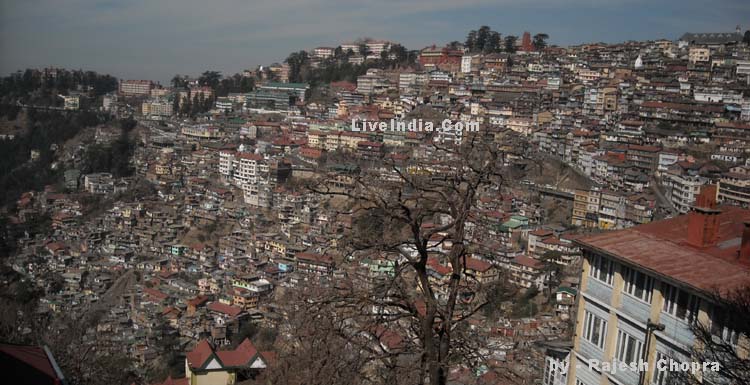
|
Shimla/ Manali Information (Online
Hotels Bookings)
|
|
| Intoduction
SHIMLA OF LORD LAWRENCE
In 1847, the Punjab
was annexed to the British and John Lawrence was given the work,
Lord Dalhousie- had entrusted him-the difficult task of writing
the first of the report of the Punjab Administration in the year 1850.
Perplexed and harried, Sir John proceeded to Shimla where he
ran into Sir Richard Temple, known as the Knight of the Pen in India.
The very first
report on British administration was penned in the cool climes
of the beauteous fast growing resort. In 1857, came the revolt
of the sepoys and the first War of Indian Independence, the horrors
meted out on both sides were indescribable, but in calm, serene,
Shimla there was hardly a ripple, life went on its merry way.
The mutiny
was quelled and the queen appealed to her new subjects as a personal
"Female Sovereign" who had instructed her prime minister to "breathe
feelings of generosity, benevolence and religious moderation and point
out the privileges
which the Indians will receive in being placed on an equality
with the subjects of the British Crown ... "Lord Canning became
the first Viceroy of India, a great darbar was held on November 1,1858
at Allahabad and the new Viceroy commenced his journey of reconciliation,
reaching Peshawar in Feb.1860. Retracing his steps, he paid
a visit to Shirnla before returning to Calcutta in the heat of May.
Broken by the death of his wife, he left India in 1862, himself a dying
man.
Sir Johh Lawrence
took the first steps to secure the Punjab tenant farmer his
rights to save them from the rapacious landlords. In Amritsar
district alone, out of 60,000 heads of families, 46,000 would have been
degraded if all the claims of landlords were accepted. The great debate
on the bill took place on Oct 18, 1868, and again the venue was Shimla.
Cool heads prevailed
and the cultivators were saved, at the same time recognising
the claims of the landlords. The importance of Shimla continued
to rise and more top officials took up residence for long periods
of time. While the Queen ruled in England, her Viceroy in India
began to hold court in the lovely town in the elysium heights-the latter
day Olympus. In
1870, the Viceroy, the dashing Irish Earl of Mayo, who wooed
the princes, set about having a Viceregal Lodge built in Shimla
for the summer residence. The capital, Calcutta, hot and sticky did not
appeal to Governor General and later Viceroys, the move to Shimla
was long and arduous, so more time was spent there than in Calcutta.
Lord Mayo, in 1869
had started mending relations and consolidating England's position
with Afghanistan, the Shah of Persia and the Czar in St.Petersburg.
In the midst of these manifold labours his life was cut short
by the knife of an assassin, he was on a visit to the penal
settlement of the Andamans and on Feb 8,1872 was stabbed to death
by a convict. |
|
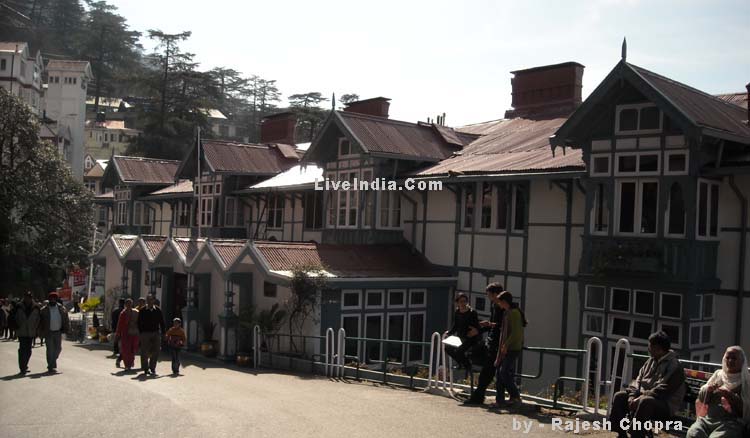
|
The many-turretted splendiferous
lodge awaited his arrival, and received the banker Viceroy
Lord Northbrook, brilliant but colourless. In spite of the
Viceroy, however, Shirnla society had begun to jump. Elegant
cottages and Georgian style manor houses came up. The Duke
of Edinburgh visited India in 1872 and was followed by his brother,
the Prince of
Wales, later Edward VII, in 1876. In England the policy
toward Afghanistan had changed with the ultra conservatives and their Imperial
attitude, in power. A preponderating British influence was to
be established-Northbrook resigned and restless imperialism came
into power with the appointment of Lord Lytton in 1876. At this time
summer festivities consisted of balls at the Viceregal Lodge, the
residence of the Governor of the Punjab and at the estate of the
Commander-in-Chief in the evening, when the dance and revelry went
on till the late hours of the night. In the day, there were polo and tennis
tournaments followed by an evening at the Gaiety Theatre, built to look
like the old Garrick
in London, and which presented eight to nine plays a season
produced by the Amateur Dramatic Club, whose Green Room was
a social club. Cricket matches were played at Annandale, Daddy
Grace's exploits in the game were the talk of the town both in London
and Shimla. Twice a week gymkhanas and races were held in the
spacious play-ground.
LYTTON SHOCKS SHIMLA SOCIETY
Into the midst of all
this came Lord Lytton, fresh and 44. Away from the court of Queen Victoria,
the Shimla hostesses were, sometimes more royal than the Queen. After vying
with one another over the cherished invitations to dine at the Imperial
Lodge, they proceeded to get shocked when they noticed His Excellency casually
lighting up a cigar and smoking between courses at dinner. With his wilfulness
towards the Afghans, he shocked the British Cabinet. In 1876, Atta Muhammad,
British agent at Kabul visited Shimla to discuss the Afghan question, but
better councils did not prevail. Atta Muhammad was dismissed with presents
for the Amir who was not fooled. In 1877, on the first day of the morith,
Lord Lytton proclaimed to the princes at a Darbar in Delhi, that the Queen,
had assumed the title of Empress of India. The Queen after the death of
Prince Albert in 1857, lived in lonely
seclusion at Windsor
Castle, the new title assumed at the request of Disraeli, gave her new
earnest in life and she left the castle to go to her relieved subjects
in London, The Durbar in Delhi was held with great pomp and splendour.
Lord Ripon, who succeeded
Lord Lytton started the ball rolling in giving Indians a beginning in the
elective system and share in the administration of local affairs. When
he left, it is said, "His journey from Shimla to Bombay wasa triumphal
march such as India has never witnessed-a long procession in which 70 million
people sang hosanna to their friend". With the coming of Lord Ripon in
1880 and his liberal measures, the new educated middle class was immensely
encouraged. An occasion was needed to precipitate still further middle
class sentiment into political form. |
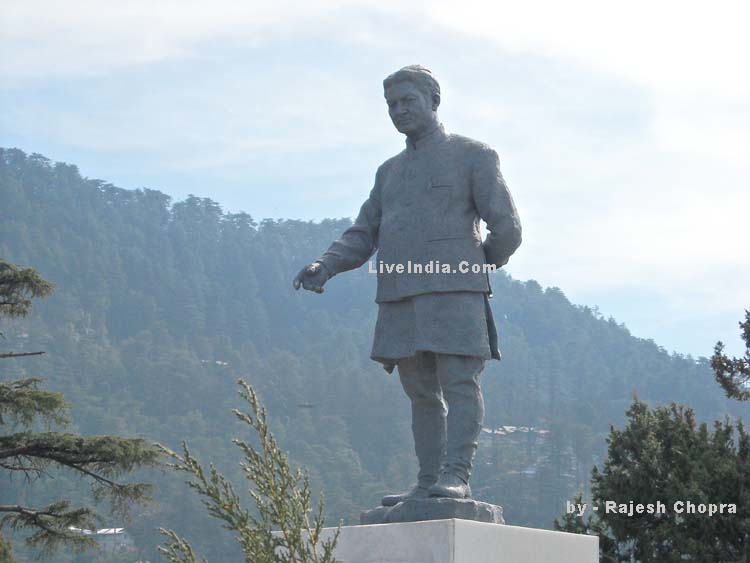
INDIAN NA TlONAL CONGRESS
BORN
The occasion was provided
by Lord Ripon himself with the liberal bill, its political precipitation
was the Indian National Congress. Overlooking the Ridge, in Shimla near
the Church is a medium sized gabled cottage which belonged to retired British
Civil Servant, MrAO. Hume, the founder, in 1885, of the Indian National
Congress .. From here along with three other liberal English civil servants,
Hume launched the fledgling body-the membership was 70 and the first session
was held in the December of that year, at Bombay. Among the first presidents
was famed Theosophist Annie Besant, and among the first to give it praise
was the Viceroy, Lord Dufferin. Hume's house is now headquarters of the
Shimla The-osophist Society.
At the start, the Congress
was a modest body with only the original 70 members as the deligates to
the first session. 'But from the first it formed a focus for the new classes'
political opinions. By 1900, it had spread all over India and was regarded
by the forward-looking members of the new class as the natural mouthpiece
of their aspirations, its support coming from the new professionals, with
a sprinkling of businessmen and some landlords of Bengal. Besides Hume,
other Englishmen lent it support to the extent that by 1900 three had been
elected president of the new body. The initial harmony did
not prevail long, however,
British officials, devoted to the peasants, were paternalistic and did
not appreciate these new men who seemed to them neither Indian nor British;
they were not easy-going like the aristocrats or respectful, like the peasants.
By 1900, it had already
grown into a position of constitutional opposition to the government, its
members, criticised, carped and claimed rights. To the average official,
criticism savours of sedition and Congressmen were, consequently, frowned
upon, Indian nationalism was still a movement rather than a force, an aspiration
rather than a general dynamic. The polished Dufferin who did nothing and
did it very well was succeeded by the aristocratic Lord Lansdowne in 1888,.
previously Governor General of Canada and full of administrative experience,
but wanting in the tact and discretion and quiet strength of Lord Dufferin.
A silly imperialism predominated in his Council and his thoughts were more
occupied with the land beyond the North-West
Frontier of India. The
influence exerted by the chief military and political advisers over the
Viceroy became the matters of universal comment.
He renewed Lord Lytton's
policies setting the course for draining India of money and men in
the wars ever since 1896.
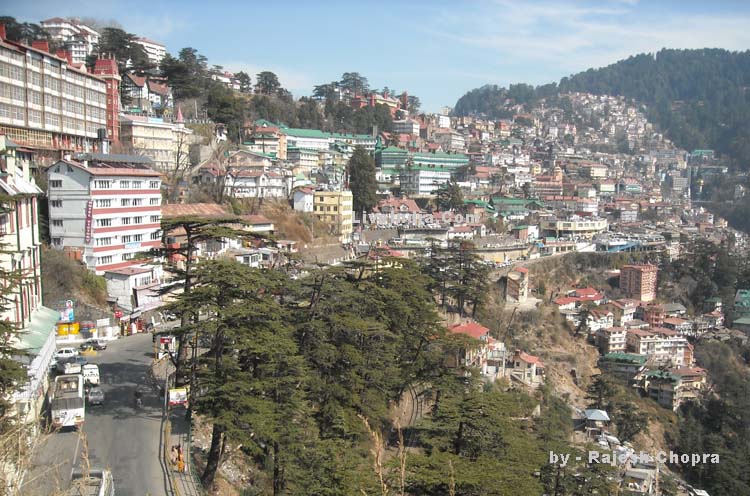
LANSDOWNE'S SHIMLA
There never was a time
since 1838, when Shim/a was more actively the centre of ambitions and designs
beyond the Indus. "The most favoured type of Indian official was no longer
the Provincial Governor or the sagacious Resident, but the Warden of the
Marches of Baluchistan, Sir Robert Sandeman, whose unique aim was to extend
the zone of British influence beyond the frontier and whose method was
to participate in tribal dissensions and to benefit by them". 'Sandemania',
which had proved so contagious, then became epidemic in high quarter. !n
his efforts to gain the post of Gilgit, over a hundred miles to the north
of Kashmir, Lansdowne set aside for a while, the ruler, Partap Singh, of
Kashmir and controlled the affairs of the state through the British Resident
appointed in 1885. Mr. Plowden, the Resident, began to assume an authority
that alarmed even the Foreign Office where it was deemed imperative not
to annoy the Kashmir Darbar. Plowden was transferred but Lansdowne deprived
the ruler of all powers on a trumped up charge of promoting misery and
oppression. A debate followed in Parliament and instructions were sent
post haste to Shimla to restore the Maharaja.
The Scottish working peer
Lord Elgin followed Lansdowne, in England the old Liberal Gladstone retired
in 1894 and the air was thick with rumours of war and manifest destiny
while the press breathed of expansion of .the Empire. Sir Herbert, now
lord Kitchener, conquered Dongola and moved up to the Nile, European armies
disgraced themselves with babarities putting down the Boer Revolt in China.
In South Africa the British got ready to revenge the crushing of the Jameson
expedition against the Transvall. The Boer war followed, lasted two years,
costing the lives of 20,000 men and 200 million pounds. A young Indian
lawyer led an ambulace brigade to help the British-his name- Mohandas Karamchand
Gandhi. In the midst of all this, Lord Elgin,
who, due to his illustrious
background, (his father was Viceroy after Canning) was steeped in the traditions
of peace and goodwill towards the Indian people, was forced into a war
against Chitral in 1897 while large parts of the country were being desolated
by famine, killing over a million people in Northern India, Bengal, Central
Province, Madras and Bombay. As if this was not enough, a severe bubonic
plague broke out in Western India. The army was called out.
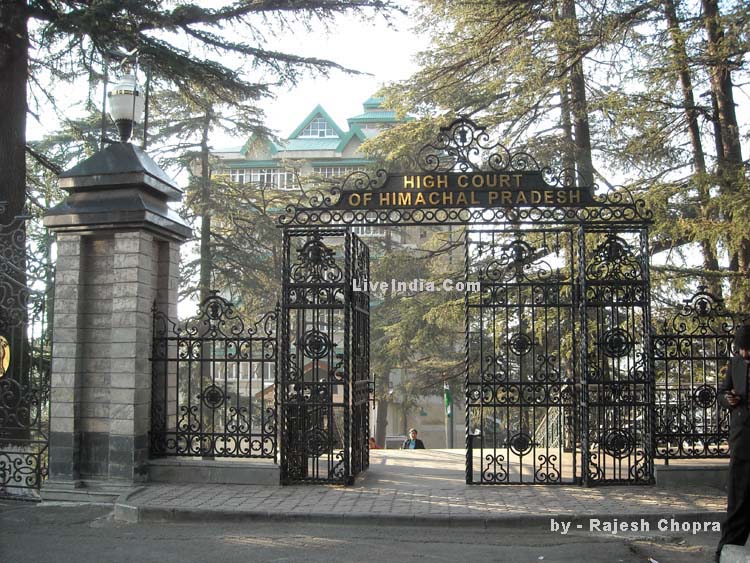 Lord Elgin's father had come
as Viceroy in the year 1862, pursuing a policy of peace and with a feeling
of genuine sympathy for the Indian people. He had found the life in Shimla,
even in those early days, hectic and preferred the quiet of Dharamsala
instead. He had hardly been in India for two years when he died in Dharamsala
where he lies buried in the Cathedral of St. John of the Wilderness. Amidst
the horrors of the wars both in India and South Africa, Queen Victoria
passed away in January 1901, lamenting the disasters that closed her long
and prosperous region.
Lord Elgin's father had come
as Viceroy in the year 1862, pursuing a policy of peace and with a feeling
of genuine sympathy for the Indian people. He had found the life in Shimla,
even in those early days, hectic and preferred the quiet of Dharamsala
instead. He had hardly been in India for two years when he died in Dharamsala
where he lies buried in the Cathedral of St. John of the Wilderness. Amidst
the horrors of the wars both in India and South Africa, Queen Victoria
passed away in January 1901, lamenting the disasters that closed her long
and prosperous region.
To India came Curzon,
a romantic and brilliant aristocrat touched with late Victorian imperialism.
The news was received with joy and relief in India he was received with
an enthusiasm that was as universal as it was sincere. With a gift of eloquence,
he had an elegant style. He was dazzled by the East, like Napoleon, and
beguiled by India. With the Victoria Memorial in Calcutta, he provided
a monument to British India, and at the same time, founded the Imperial
Library and an archaeological department to preserve existing monuments
and discover other antiquities. With energy, industry and intelligence,
of a high order, he had already made his mark in public life in England.
Vastly travelled, he had
written on Central Asia, Persia and the Far East and, above all, with a
gift of eloquence and elegant style, he had a real appreciation of oriental
life; he had an admiration for oriental art and literature which befitted
him for his role as ruler of an oriental nation. Brilliant, young, and
ambitious, and an ardent Imperialist, he evinced a high regard for British
power and prestige.
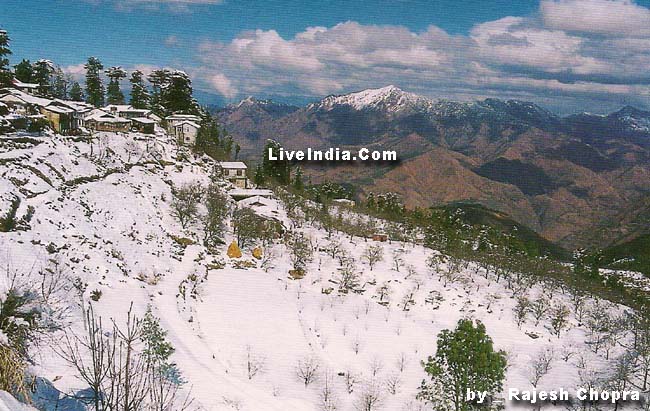
|





